

Greetings from Eastern Michigan University!
Welcome to the new school year! I hope your summer was restful and restorative. The EMU Admissions team is eager to partner with you, supporting students through the college application and enrollment journey. As we embark upon the new academic year, I want to share the many ways EMU has been working hard this summer to enhance the opportunities available to you and your students. This newsletter is packed with valuable information and resources including: new merit-based scholarships, academic program highlights, and professional development opportunities designed especially for you on EMU’s campus. Here are some important updates and resources:
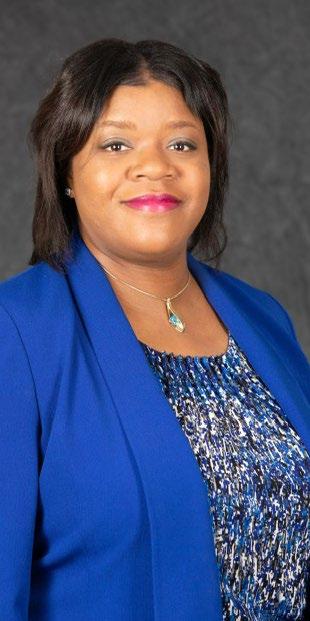
• We have increased the value and expanded the criteria for our merit-based scholarships. Effective Fall 2026, Emerald scholarships will be valued at $3,000-$12,000 per year, making an EMU education more affordable. Awards are based upon the students’ academic record at the time of admission. The deadline for merit-scholarship upgrades is March 15. Please visit emich.edu/scholarships for details.
• EMU is test-optional again this year! Students may apply through the EMU Slate application or the Common App at emich.edu/admissions.
• EMU supports student success academically, professionally, and personally. 90% of our undergraduates do not have classes on Fridays. This provides students with time for internships, coursework, self-care, campus events, volunteer work, etc.
• October is Michigan College Application Month! Eastern Michigan University is proud to support this initiative by waiving the application fee for students throughout the month of October. Don’t miss this opportunity! Share this fee waiver code with your students: MCAM.
• EMU is collaborating with the Detroit College Access Network to host the Metro Detroit College Access and Success Conference on October 15. The conference will be held in the Student Center on EMU’s campus. For more information and to RSVP please visit: https://www.detroitcan.org/2025conference
• Please join us on October 22 from 11 AM - 2:30 PM for our annual High School Counselor Appreciation Luncheon. It’s an opportunity to learn more about EMU’s admissions process, scholarships, academic programs, facilities, campus resources, meet with faculty and staff, and tour our beautiful campus. Please RSVP at emich.edu/admissions/counselor-resources to secure your spot—space is limited.
I look forward to working with you this school year as we collaborate to make a meaningful impact in the lives of our students. Thank you for your commitment to student success and for helping them achieve their fullest potential.
Sincerely,
Dr. LaJoyce Brown Director of Admissions
FIRST-YEAR STUDENTS
Next Steps Checklist
To enroll at EMU, students must login to their admitted student portal at enrollment.emich.edu/status and complete the following:
1 Submit your $55 enrollment deposit
2 Activate your My.Emich account
• Go to account.emich.edu
• Select “Activate Account”
• Enter your EID and NetID (both found in your admitted student portal)
• Select “Activate”
• Enroll in DUO Security: This will be required to set up your account. Visit emich.edu/it/security/duosecurity for more information.
3 Register for Student Orientation Advising & Registration (SOAR) and EMU Connect
Students will also need to complete the following:
Submit the FAFSA at studentaid.gov
• EMU School Code: 002259
Apply for on-campus housing at emich.edu/housing
• There is a $150 application fee
• Students who live more than a 50-mile radius from EMU are required to live on campus.
Send your final official high school transcript after graduation
• Final transcripts must be sent via Slate, Parchment or email from your high school counselor to transcripts_admissions@emich.edu
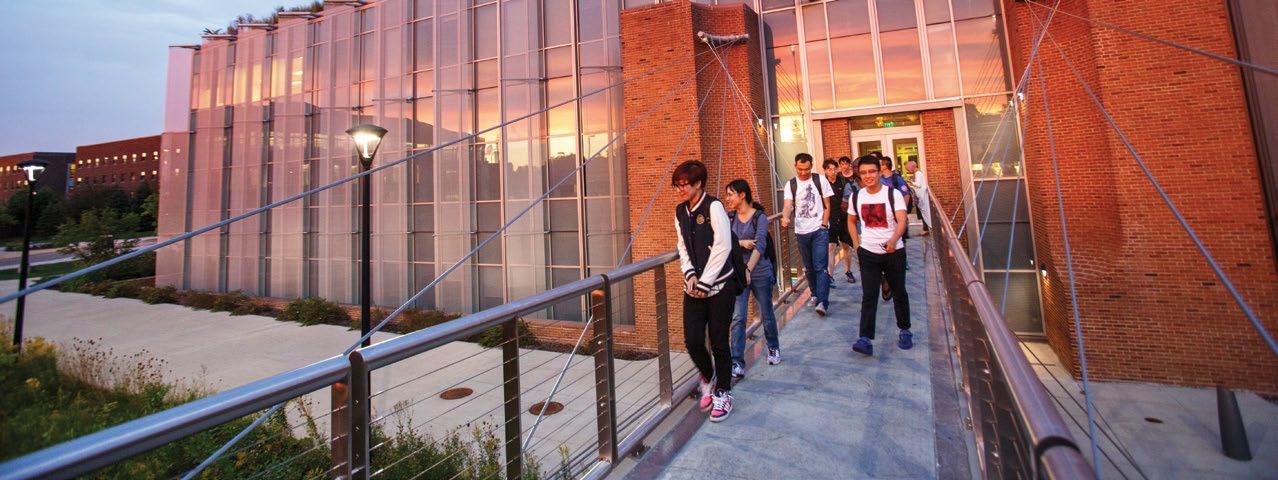
Accessible education.
All undergraduate students pay in-state tuition, no out-of-state fees and 94% of EMU freshmen have received some form of financial aid. At EMU, we assist students in managing college expenses by providing affordable tuition, scholarships, and on-campus jobs.
Eagle Guarantee Scholarship
AWARD Free tuition and on-campus housing support
REQUIRED Must be a first-year student with a minimum 3.0 GPA, be eligible for the Pell Grant and Michigan Achievement Scholarship, and and have assets less than $60k.
→ emich.edu/eagle-guarantee
Presidential Scholarship
AWARD Full tuition and full room and board
REQUIRED Must have a 3.5+ cumulative GPA and 25+ ACT OR a 1200+ SAT score (critical reading and math) OR 3.85+ cumulative high school GPA only.
DEADLINE: December 15, 2025
→ emich.edu/presidential
Emerald Scholarship
AWARD Up to $12,000 per year
REQUIRED Based on cumulative GPA and test scores at time of application.
→ emich.edu/scholarships
Transfer Scholarships
AWARD Up to $4,000
REQUIRED Eligibility begins at 24 transferable credits from a regionally accredited institution and a 3.0 GPA.
→ emich.edu/transfer
Alumni Scholarships
REQUIRED Must have a parent or grandparent who graduated from EMU and be admitted to EMU with full-time status.
→ emich.edu/alumni

Counselor Events:
Wednesday, October 15
Metro Detroit College Success and Access Conference
8 AM detroitcan.org/2025conference
Wednesday, October 22
EMU Counselor
Appreciation Luncheon
11 AM - 2:30 PM enrollment.emich.edu/ register/counselorlunch

EMU Preview Days:
Friday, October 10
Health & Human Services Preview Day 10 AM
Friday, November 14
Art & Design Preview Day 10 AM
Attendee Registration: enrollment.emich.edu/portal/ preview_day
Saturday, October 25
Explore Eastern Open House
10 AM - 2 PM Check-in begins at 9:30 AM emich.edu/explore-eastern
Campus Tours:
Daily Monday-Friday, Select Saturdays
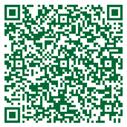
Campus tours are ideal for a prospective EMU student and their family. Tours are scheduled Monday through Friday and select Saturdays throughout the academic year. Register for a campus visit today to experience campus from a student’s perspective.
Group Tours:
Group tours are available for schools or community groups between 15 and 100 ninth-grade students and above. If you have any questions, please email us at group_tours@emich.edu.

Empowering Youth Health Leaders
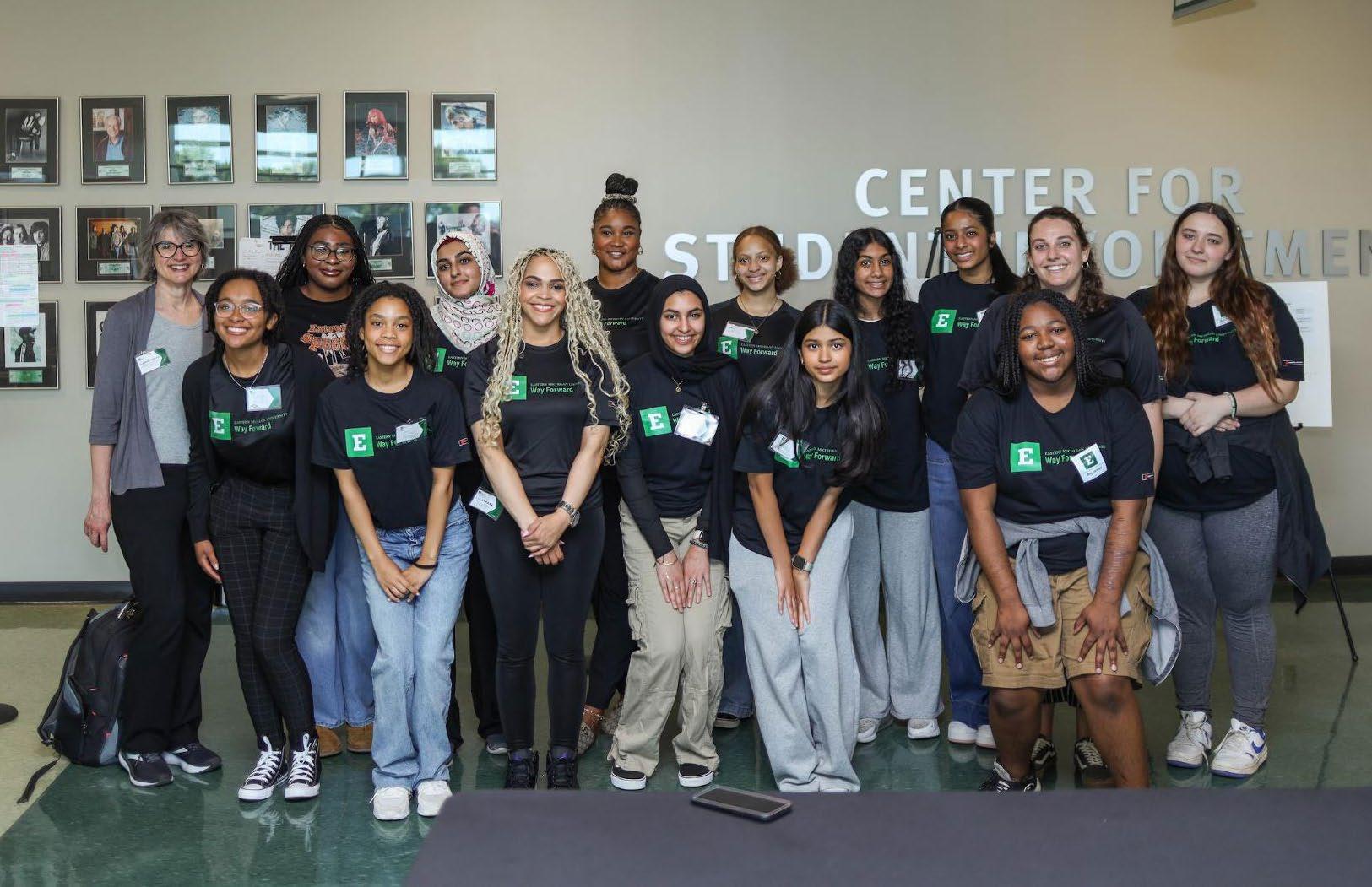
The Way Forward Fund is an initiative of Toyota to support people impacted by significant injuries, starting with a focus on children recovering from traumatic brain injuries (TBI). In collaboration with Engage @ EMU and The College of Health and Human Services, the Way Forward Fund has developed a Youth Health Educator Corps. aimed at training high schoolers in TBI and prevention.
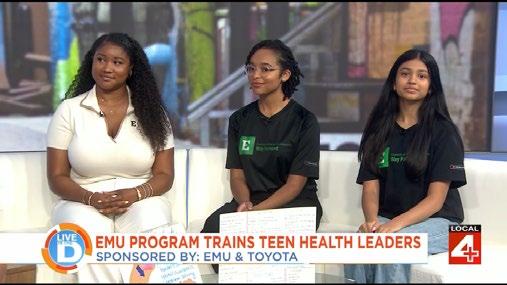
What is WF?
Way Forward is an 8-week paid leadership opportunity for high schoolers in WayneWestland, Ypsilanti, and Romulus school districts to be trained as peer Youth Health Educators (YHEs).
We follow a “train the trainer” model. Each cohort meets once a week for 90 minutes either on EMU’s campus or at students’ high schools!
Curriculum Overview:
• Introduction to peer health education & setting group norms
• What is Traumatic Brain Injury (TBI)
• Different ways brains can get hurt
• Impact of TBIs on brain development
• Recognizing signs & symptoms of TBIs
• Ways to care for TBIs
• Action & advocacy
THE WAY FORWARD FUND:
Why Join
Not only do YHEs become experts in TBI + Prevention, YHEs are granted a wide variety of ongoing leadership opportunities spanning from career exploration through the College of Health and Human Services (CHHS) to experiential learning through the Psychology and Neuroscience Programs, to personal coaching, resume building, and networking opportunities. Way Forward Alumni have access to ongoing paid opportunities to disseminate TBI information and prevention to their communities.
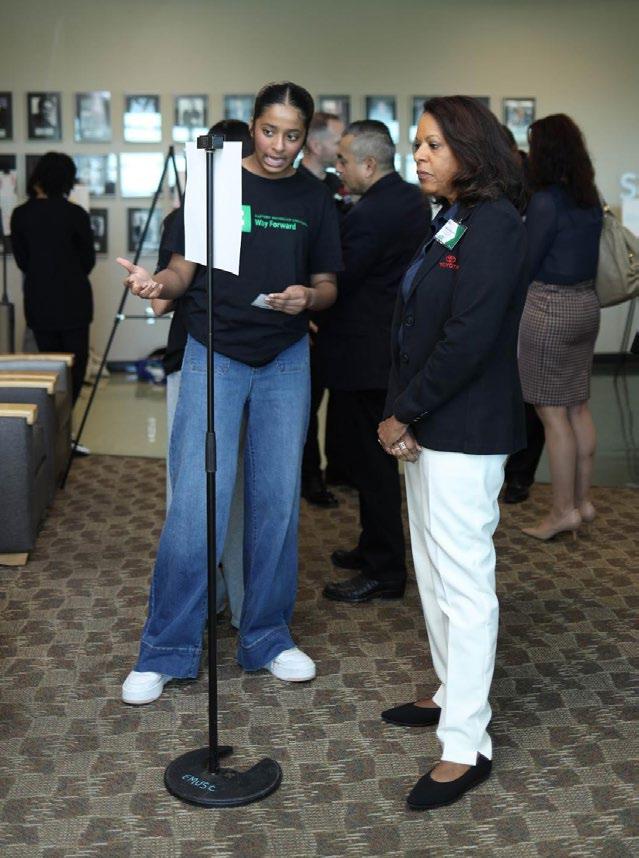
Student Perks
• $100 payment for program completion
• Snacks
• Field trips
• Experiential Learning
• Digital Badge
Learn More
Visit our website www.emich.edu/engage/ community/way-forward/
Check out our news segment on Live In the D! →
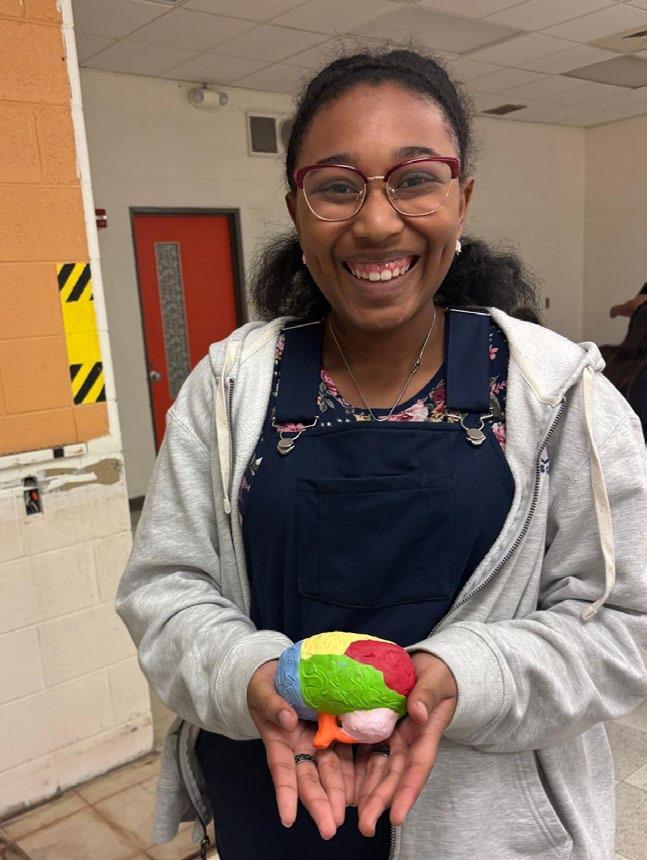
Building the Future of Art: The Windgate Arts Complex at EMU
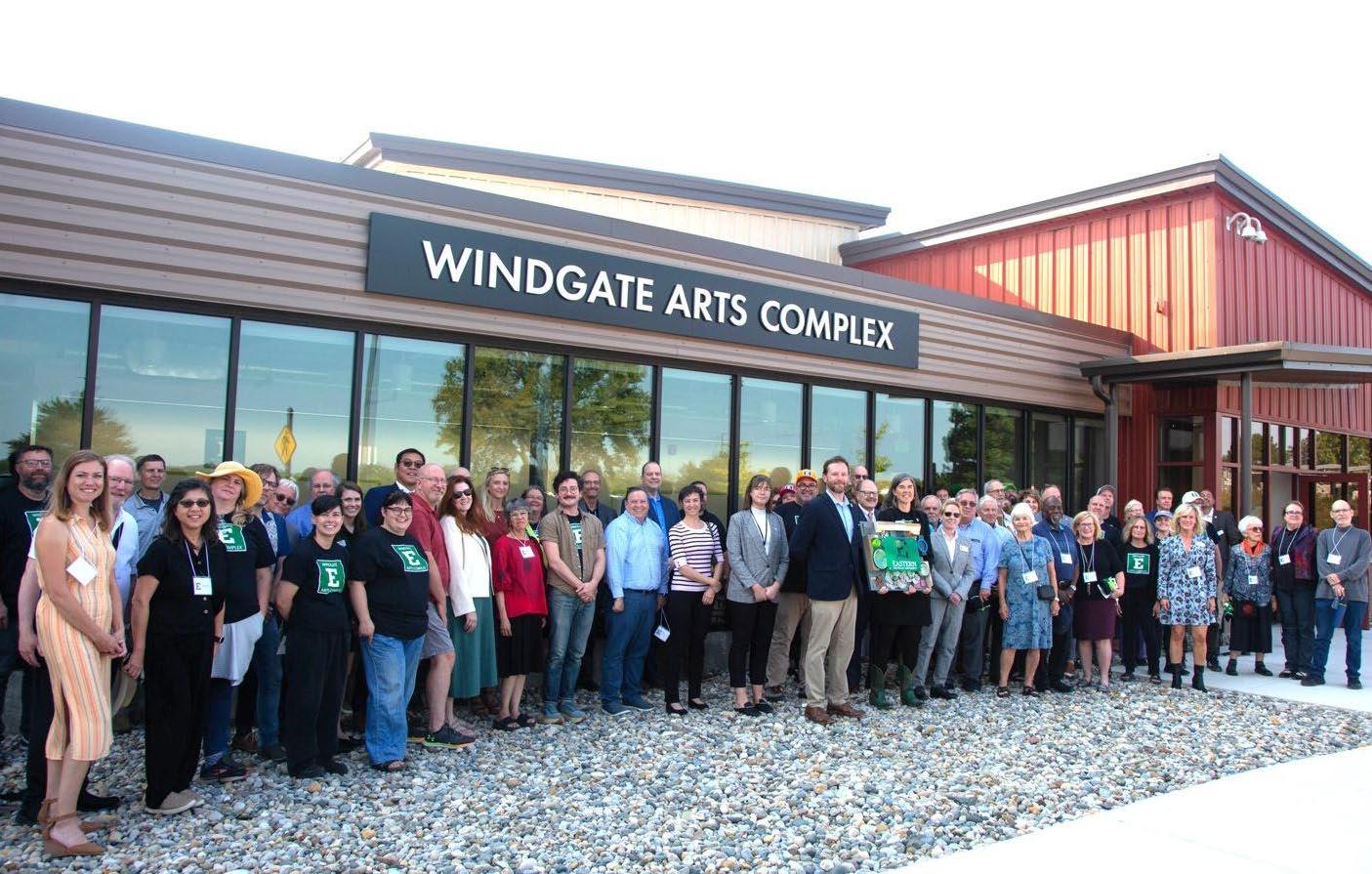
The impact of the Windgate Arts Center on the 3D media programs and the broader campus community has been nothing short of transformative. This new space has fostered creativity, collaboration, and innovation, allowing students and faculty to explore the intersection of art and community in life-changing ways.
Unprecedented Opportunities and Growth
The immediate impact of the Windgate Arts Center is evident in several key areas. Anticipating the move, 3D faculty invited Dr. Joey Quiñones, a nationally recognized artist and scholar, and the Head of Fiber at Cranbrook Academy of Art, to be the McAndless Scholar for the College of Arts & Sciences. As a visiting professor, Dr. Quiñones facilitated several campuswide and community events. He also worked alongside graduate students in his
studio within the new complex, offering an invaluable opportunity for students to learn from a professional artist.
The new furniture design studio, considered one of the largest and best in the region, has already attracted two new graduate students to the program. Two classes are now offered each term, and both are filled with eager students. The interior design program has recognized the value of this space and now expects its students to take furniture design classes as well. Overall, there has been a notable increase in enrollment across all 3D Media classes this year.
Fostering a Collaborative Community
The Windgate Arts Center has created a new gathering space for the School of Art & Design. The Christopher Kaufman Critique
SCHOOL OF ART & DESIGN
Atrium, for example, has hosted the school’s end-of-year awards celebration for students, faculty, and donors. This space allows the entire art school to function as a cohesive community and has been actively used for class critiques, small group meetings, and moments of inspiration.
Under one roof, students and faculty are now able to create assignments and projects that incorporate multiple media and processes, a feat that was not possible before. This is most evident in how artworks now utilize a hybrid of digital fabrication and traditional hands-on methods. The proximity has also fostered stronger bonds among graduate students and faculty, who now see each other daily in ways that were only dreamt of before.
Shaping the Future of Art and Design
Thanks to this incredible facility, the School of Art & Design has seen growth in both student enrollment and engagement with the arts across campus. The center has become a hub of inspiration where students from all disciplines can experience, appreciate, and participate in artistic expression.
None of this would have been possible without the generosity and vision of the many people who worked toward this shared dream. The school is forever grateful to individual community partners, Eastern Michigan University, and the Windgate Foundation. This support has truly shaped the future of the Eastern Michigan University School of Art & Design. Now, whatever the students and faculty can dream, they can build.
Undergraduate
majors and career paths:
Bachelor of Arts (BA): A strong liberal arts education through both studio and art history courses.
Bachelor of Arts - Art History (BA): Explore artworks as documents of particular times, places, societies, and individuals. Small upper-level classes allow for lively discussion and individual attention. Art History Minor available.
Bachelor of Fine Arts (BFA): The Bachelor of Fine Arts is designed to encourage students to develop a personal focus and direction as well as learn to function professionally as artists. The program provides a well-crafted balance between the conceptual and technical aspects of art making. Students may choose from four areas of concentration within the BFA:
• Graphic Design
• 2D Media (painting, watercolor, drawing, printmaking)
• 3D Media (furniture design, digital fabrication, metalsmithing, ceramics, sculpture and fibers)
• Photography / New Media
Bachelor of Fine Arts - K-12 Visual Art Education (BFA): Art teacher candidates transition through four areas of study (general education, art studio, art pedagogy, and general education pedagogy) which culminate in the student teaching experience. Graduates of our program earn a Bachelor of Fine Arts K-12 Visual Art Education degree which qualifies them for PK-12 visual arts certification in the state of Michigan; a certification accepted in 46 states across America.
Simulation, Animation and Gaming [BS]: A strong foundation in theory and practice into courses designed to imbue game and animation skills.
For more information about undergraduate and graduate degrees in the School of Art & Design, please visit: www.emich.edu/art/programs/index.php
See the video that highlights our new state-of-the-art 3D Media Studio in the Windgate Arts Complex at our art school website here →
Beyond the Classroom: Campus Life Opportunities at EMU
The Office of Campus Life promotes student success and belonging by helping them explore new interests, identities, and communities. The office strives to enrich the campus community by creating opportunities that are experiential, impactful, and centered on the diverse identities and communities represented on campus. The team of student employees is the heart of the operation, reflecting the diverse student body and challenging the office to respond to the shifting needs and interests of everyone on campus.
A Community-Wide Impact
The Office of Campus Life is honored to be one of the departments on campus that serves and supports the entire community at some point throughout the year. The office coordinates 84% of its offerings in collaboration with over 30 different departments and student groups. 50% of the events held center on underrepresented or marginalized populations.
Students consistently provide positive feedback on their experiences, rating the events a 4.6 out of 5 stars on average. Feedback has included comments like, “It was the perfect thing to get my mind off school and make me more relaxed” and “The event was well organized and I met a lot of new people.” Another student called an event “Absolutely lovely, one of the best events I’ve ever been to at EMU!”. The events have attracted nearly 7,000 attendees, with 2,700 individual students attending at least one event—representing 40% of the full-time enrolled undergraduate student population.
More Than Just Events
Events are not the only way students can make connections. The Office of Campus Life supports over 150 student organizations by offering a platform for them to share their
mission and offerings, sponsoring their events, and coordinating experiences that help them build effective and ethical leadership skills. These student-run communities focus on developing connections and skills related to academic/professional, cultural/identity, advocacy/service/wellbeing, creative arts/ media/entertainment, and social/recreational interests. They include 19 recognized social Greek organizations across the National Pan-Hellenic Council (NPHC), Multicultural Greek Council (MGC), Interfraternity Council (IFC), and College Panhellenic Association (CPA).
Fraternity and Sorority Life
Fraternity and Sorority Life (FSL) at EMU offers students the opportunity to grow as leaders, scholars, and engaged citizens. These opportunities include leadership development programs, service projects, academic support initiatives, social events, and cultural celebrations. Members also participate in various philanthropy and community service efforts that give back locally and nationally.
The FSL team within Campus Life provides personalized support, resources, and guidance to both individual members and chapters, helping them to succeed academically, operate effectively, and uphold EMU’s values. Students are encouraged to take on leadership roles within their organizations and governing councils, which promotes the development of valuable skills such as communication, time management, and event planning. Through FSL, students build lifelong relationships and a sense of belonging while connecting with a network of alumni and campus partners.
To stay connected and learn more about Campus Life and Fraternity and Sorority Life at EMU, follow them on Instagram (@campuslife and @emufsl).
Supporting Student Success: EMU’s Disability Resource Center
Eastern Michigan University (EMU) is known for its diverse student body, which includes its strong support for students with disabilities. The goal of the office is to make the process for students and their families as easy and stress-free as possible. It is also their role to ensure that when a student is entering a post-secondary learning environment, the university provides equitable access while they complete their education. The office works to set students up for success, provided they utilize the available resources and approved accommodations.
The Accommodation Process
Students who currently have an Individualized Education Program (IEP) or 504 plan, regardless of their most recent testing or diagnosis, should apply to work with the office as soon as they have an EMU email account. Students who do not currently have a plan may still apply, provided they have a diagnosis from a medical professional. Once the student submits the required information, a case manager will reach out to review what reasonable accommodations would be available as they transition to college life. These meetings can occur in person or via Zoom. The accommodations reviewed are for housing, nutrition, and academics and can usually be completed in one meeting. Once a student is approved, they will not need to go through this process again as long as they remain a student at EMU. The only requirement is to renew their accommodations online when they register for their next semester, as accommodations are connected to individual courses.
Temporary Accommodations and Family Involvement
Students may not realize they can begin this process at any time, as there is no deadline. The office recognizes that unplanned events can occur, impacting a student’s ability to participate in college activities, and provides temporary accommodation(s) for any medical concern or emergency such as a fracture, concussion, or other mental health reason.
A common question from families is about their involvement once a student is accepted. Parents are only as involved as their student wants them to be. A parent may be on a student’s Family Educational Rights and Privacy Act (FERPA), and the student can invite them to any meeting. However, no changes to an accommodation would be made without the student’s input.
Another question from family members relates to success strategies, time management, and college-readiness. While students often have more one-on-one support in K-12, this does not necessarily transfer once they enter higher education. These are not considered reasonable accommodations because the resources for these are available to all students at EMU through the Holman Success Center. Every student working with the office is provided with referrals to this support center, but it is up to the student to follow through with meetings and utilize the resources.
For any questions about the process, students and their families can visit www.emich.edu/drc, email drc@emich.edu, or call 734-487-2470.
